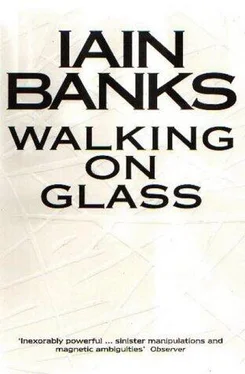Time was another problem in the Castle Doors. It went quicker the closer you were to a clock. The further away from a time-piece you were, the more it not only seemed to but did drag. The clocks in the castle were immovable, and erratic too, going sometimes faster, sometimes slower. There was one great clock mechanism buried deep in the warmer depths of the place, some vast assemblage of gears and creaking cogs which powered all the clock faces in the ramshackle shell of the castle. Rotating shafts buried in the walls transmitted the energy from the central machinery to the faces, and rumbled in some places, squeaked in others, and leaked oil ubiquitously.
The oil mingled with the warm salty water which leaked from places in the ceilings, and that was one of the reasons they had asked for some sort of banister rail to hold on to in the narrow winding-stair. The smell of oil and brine permeated the castle, making Ajayi think of old harbours, and ships.
Why time should go faster the closer you were to a clock, they didn't know, and none of the castle's waiters and attendants had any explanation either. Quiss and Ajayi had carried out experiments, using identical candles, lit at the same time, one hard by the face of a clock, the other in the middle of the room with them; the candle by the clock burned nearly twice as fast. They had formulated some vague ideas which would let them use this effect to shorten the perceived time it took to play the games they had to play, but the castle clocks, or perhaps the castle itself, seemed unwilling to cooperate. Taken near a clock, the table stopped working; the red jewel in the middle stopped glowing, the projection of the board and the pieces disappeared. Added to this was the fact that the clocks themselves were so erratic; every so often they slowed down, so that time went more slowly the closer you were to them.
Whatever was affecting the rate time passed at seemed to obey the inverse square law, the phenomenon apparently radiating from each clock face, while at the same time there was a more generalised sort of effect emanating from the huge central mechanism buried somewhere in the castle's many lower levels, making everything down there happen more quickly.
The chaotic kitchens, where the seneschal had his office and where vast quantities of food were continually being prepared in conditions of the utmost confusion, noise and heat, seemed to be the worst affected place of all. Ajayi could smell the cooking odours from Quiss's ragged furs as they sat, waiting.
"Ah, here you are then," said a small voice. Ajayi looked, Quiss turned, and there at the head of the winding-stair stood an attendant. The attendant was short, about half the height of either of the two humans. It was dressed in a sort of grubby grey cassock knotted with red string at the waist. The cassock had a thin hood, held in place over the attendant's head and face by what looked like the brim from an old and worn red hat; it was squeezed down over the attendant's head, the top of the hood showing through where the hat's crown should have been. The attendant's face was hidden by a papier mache mask, as worn by all the attendants and waiters. The mask was set in an expression of abject sadness.
"Well, better late than never," Quiss snarled.
"Dreadful sorry," the attendant squeaked, shuffling closer. Little red boots, quite shiny, flickered under the hem of its cassock as it moved. It stopped near the table and bowed, putting its small gloved hands into the opposing cuffs of its robe. "You've finished the game then, oh, good. Who won?"
"Never mind who won," Quiss barked. "You know why we've sent for you, do you?"
"Yes, yes, I think so." The attendant nodded, its high voice not altogether as certain as the words. "You've got an answer, no?" It lifted its shoulders slightly, or dropped its head a little, as though frightened of being struck if its supposition was wrong.
"We've got an answer, yes," Quiss said sarcastically. He glanced at Ajayi, who smiled back and motioned towards the small attendant. Quiss cleared his throat and leaned forward towards the small figure, which shrank away without actually stepping back. "Right," Quiss said, "the answer to the question is: You can't have both in the same universe. Got it?"
"Yes," nodded the attendant, "yes, I think I've got it: 'You can't have both in the same universe.' Very good. Very logical. That sounds like it to me. I thought that. That sounds - "
"We don't care what you thought," Quiss interrupted, baring his teeth and leaning closer towards the small attendant -who shrunk back so much further Ajayi felt sure it was about to overbalance and fall backwards- "Just do whatever you have to do and let's see if we can get out of this filthy place,"
"As you say, right, yes, will do, will do," the small figure said, backing off, half-nodding, half-bowing as it made its way back- wards to the winding-stair. It tripped on a book and almost went flying, but it just succeeded in remaining upright. It turned and hurried away into the darkness. They heard its steps clattering and fading in the distance.
"Hmm," Ajayi said. "I wonder what it does, where it goes."
"Who cares as long as it's the right answer," Quiss said, shaking his head and then scratching his chin. He turned to look back at where the doorway to the stairs stood in the gloom. "I bet the little idiot forgets."
"Oh, I shouldn't think so," Ajayi said.
"Well, I do. Maybe we ought to follow it. Find out where it goes. We might be able to short-circuit this whole ridiculous process." He turned and looked speculatively at Ajayi, who frowned at him and said,
"I don't think that would be a good idea."
"It'll probably turn out to be something really simple."
"Would you care to bet on that?" Ajayi said. Quiss opened his mouth to speak, but then thought the better of it. He cleared his throat instead, and traced some, of the pattern on the top of the small wooden table between them with one stubby, yellow-grey finger. Ajayi said, "Perhaps we could just ask one of them. Ask that one when it comes back; see what it says. It might tell us."
"We shouldn't need to ask it anything, not if that's the right answer," Quiss said, looking at the old woman. 'This was your answer, remember."
"I remember," Ajayi said. "The next one can be yours, if this one isn't right, but we did agree to do it this way; it was just luck it's my answer first. We agreed to do it this way, do you remember?"
" That was your idea, too," Quiss said, not looking at her, but lowering his eyes to watch his finger moving over the table's cut patterns.
"Just don't start any recriminations, that's all," Ajayi said.
"I won't." Quiss widened his eyes, held his hands up and out, his voice suddenly high in protest, so that he reminded Ajayi of a very large young child. "It's going to be a long time before we get another chance though, isn't it though?"
"That's just the way things have been set up," Ajayi said, "that isn't my fault."
"I didn't say it was your fault, did I?" Quiss said.
Ajayi sat back, putting her gloves back on. She looked doubtfully at the man on the far side of the table. "All right then," she said.
It had taken them almost two hundred and fifty of Quiss's "days" to discover what the way out was. They had to answer a single question. But first they had to play a series of odd games, working out the rules for each one in turn, playing each one to a conclusion, without cheating or colluding. At the end of each game they had one chance and one chance only to answer the riddle they had been set. This was their first game, their first attempt to answer the question. One-Dimensional Chess hadn't been all that difficult once they worked out the rules, and now their first answer was being carried or transmitted or processed - whatever - by the small attendant with the little red boots.
Читать дальше












